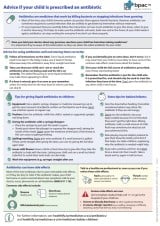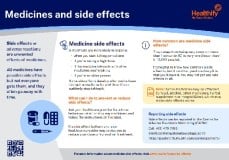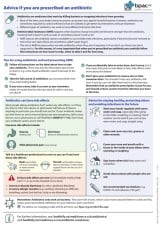You can now add Healthify as a preferred source on Google. Click here to see us when you search Google.
Minocycline
Sounds like 'min-o-sye-kleen'
Key points about minocycline
- Minocycline is an antibiotic used to treat different infections caused by bacteria.
- Minocycline is also called Minomycin® and Minotabs®.
- Find out how to take it safely and possible side effects.

Minocycline is an antibiotic used to treat bacterial infections and for skin infections such as acne. Minocycline belongs to a group of antibiotics called tetracyclines. Like all antibiotics, minocycline isn't effective against infections caused by viruses.
In Aotearoa New Zealand, minocycline is available with a prescription written by a prescriber.
Minocycline is only partially funded by Pharmac(external link) so you'll have to pay a part-charge when collecting your minocycline from the pharmacy.
In Aotearoa New Zealand, minocycline is available as tablets (50 mg) and capsules (100 mg).
- Always take your minocycline exactly as your healthcare provider has told you. The pharmacy label on your medicine will tell you how much to take, how often to take it and any special instructions.
- The usual dose of minocycline for adults is 50 mg or 100 mg once or twice a day.
- Your healthcare provider will advise you how long to take minocycline for.
- Note: Minocycline isn't usually given to children younger than 12 years of age because it can affect growing teeth and bones.
- Swallow your minocycline with a large glass of water: Take minocycline with food and a large glass of water to wash them down. Minocycline can irritate your throat and food pipe if it’s not swallowed properly.
- Remain upright for at least 30 minutes after taking minocycline. Don't lie down for at least 30 minutes after taking minocycline and don't take it just before bed.
- Swallow the tablets whole – don't crush or chew them.
- Don't take your medicine together with dairy products: Dairy foods like milk, cheese and yoghurt can stop your body from absorbing minocycline. You can have dairy products a few hours before or after your dose.
- Missed dose: If you forget to take your dose, take it as soon as you remember. But, if it’s nearly time for your next dose, just take it at the right time – don’t take double the dose.
Here are some things to know when you're taking minocycline. Other things may be important as well, so ask your healthcare provider what you should know about.
- Minocycline can make your skin more sensitive to the sun: This can cause a burning, tingling feeling on your skin when you are in the sun, or you may notice redness. When outside, protect your skin and eyes by using a good sunscreen (at least SPF30+) and wearing sunglasses, a sunhat and clothing that protects you from the sun.
- Alcohol: Minocycline can make you feel dizzy. Alcohol may increase these side-effects.
- Driving: Minocycline can make you feel dizzy. Be careful when driving or using tools until you know how this medicine affects you.
- Other medicines: Minocycline interacts with some medicines, herbal supplements and rongoā Māori, so check with your healthcare provider before starting minocycline and before starting any new products.
- Indigestion medicines, iron, calcium, magnesium or zinc: If you also take indigestion remedies, iron tablets or supplements that contain calcium, magnesium or zinc, take them at least 2 hours before or after you take your minocycline.
- If you’re taking the contraceptive pill: You don't usually need to use additional contraception if you're taking minocycline. But if the antibiotic or the illness they're treating cause diarrhoea or vomiting lasting more than 24 hours, absorption of the contraceptive pill may be affected. If this happens, ask your healthcare provider or pharmacist for advice about contraception over the following few days.
- Pregnancy or breastfeeding: Talk to your healthcare provider if you're pregnant, planning a pregnancy or want to breastfeed.
Like all medicines, minocycline can cause side effects, although not everyone gets them. If you're concerned about any symptoms you think might be related to your medicine, talk to your healthcare provider. The following information offers some guidance but doesn't include all possible side effects.
Common side effects
Tell your healthcare provider if these side effects bother you.
- Nausea (feeling sick), vomiting (being sick) or diarrhoea (runny poo): Take minocycline with or straight after food.
- Feeling dizzy: Avoid alcohol, as it can make dizziness worse. Wait until you know how the medicine affects you before driving or using machinery.
- Sore stomach or indigestion.
- Small white patches in your mouth or a white furry tongue (oral thrush): Ask your healthcare provider for advice.
- Vaginal itching, soreness or discharge (vaginal thrush): Ask your healthcare provider for advice.
Tell your healthcare provider immediately or phone Healthline free on 0800 611 116 if these occur
- Signs of an irritated or ulcerated food pipe, such as a painful throat or stomach or trouble swallowing.
- Headache and problems with your eyesight such a blurred vision.
- Problems with your hearing.
- Changes to the colour of your skin or nails.
Phone 111 for an ambulance or go to your nearest accident and emergency (A&E) clinic if these occur
- Signs of an allergic reaction such as itchy skin, and rash, swollen lips or tongue, problems breathing, like a tight chest or shortness of breath.
Read more about medicines and side effects and reporting a reaction you think might be a side effect.
Brochures
Advice if you are prescribed an antibiotic(external link) BPAC, NZ, 2024
Advice if your child is prescribed an antibiotic(external link) BPAC, NZ, 2024
Medicines and side effects(external link) Healthify He Puna Waiora, NZ, 2024
5 questions to ask about your medications(external link) Health Quality and Safety Commission, NZ, 2019 English(external link), te reo Māori(external link)
References
- Minocycline(external link) New Zealand Formulary
- Tetracyclines(external link) New Zealand Formulary
- Minomycin(external link) Medsafe datasheet, NZ
- Minotabs(external link) Medsafe datasheet, NZ
Brochures

Advice if your child is prescribed an antibiotic
BPAC, NZ, 2024

Medicines and side effects
Healthify He Puna Waiora, NZ, 2024
Credits: Healthify editorial team. Healthify is brought to you by Health Navigator Charitable Trust.
Reviewed by: Stephanie Yee, Pharmacist, Auckland.
Last reviewed:






